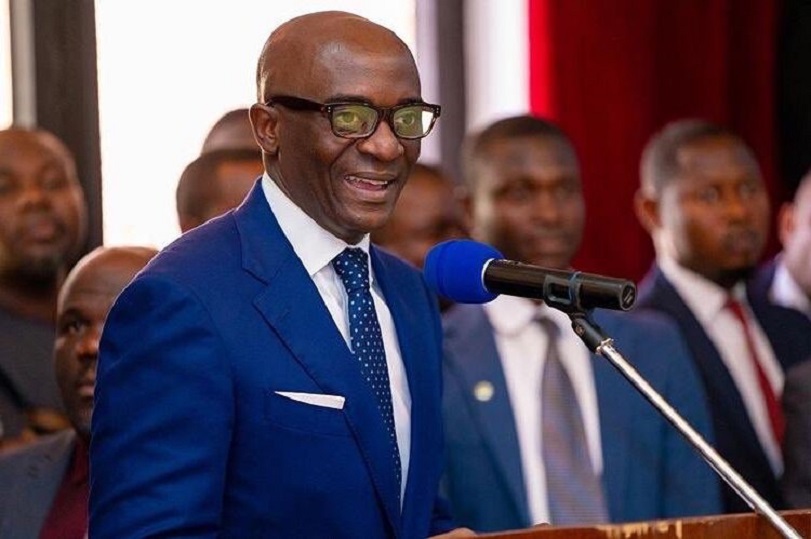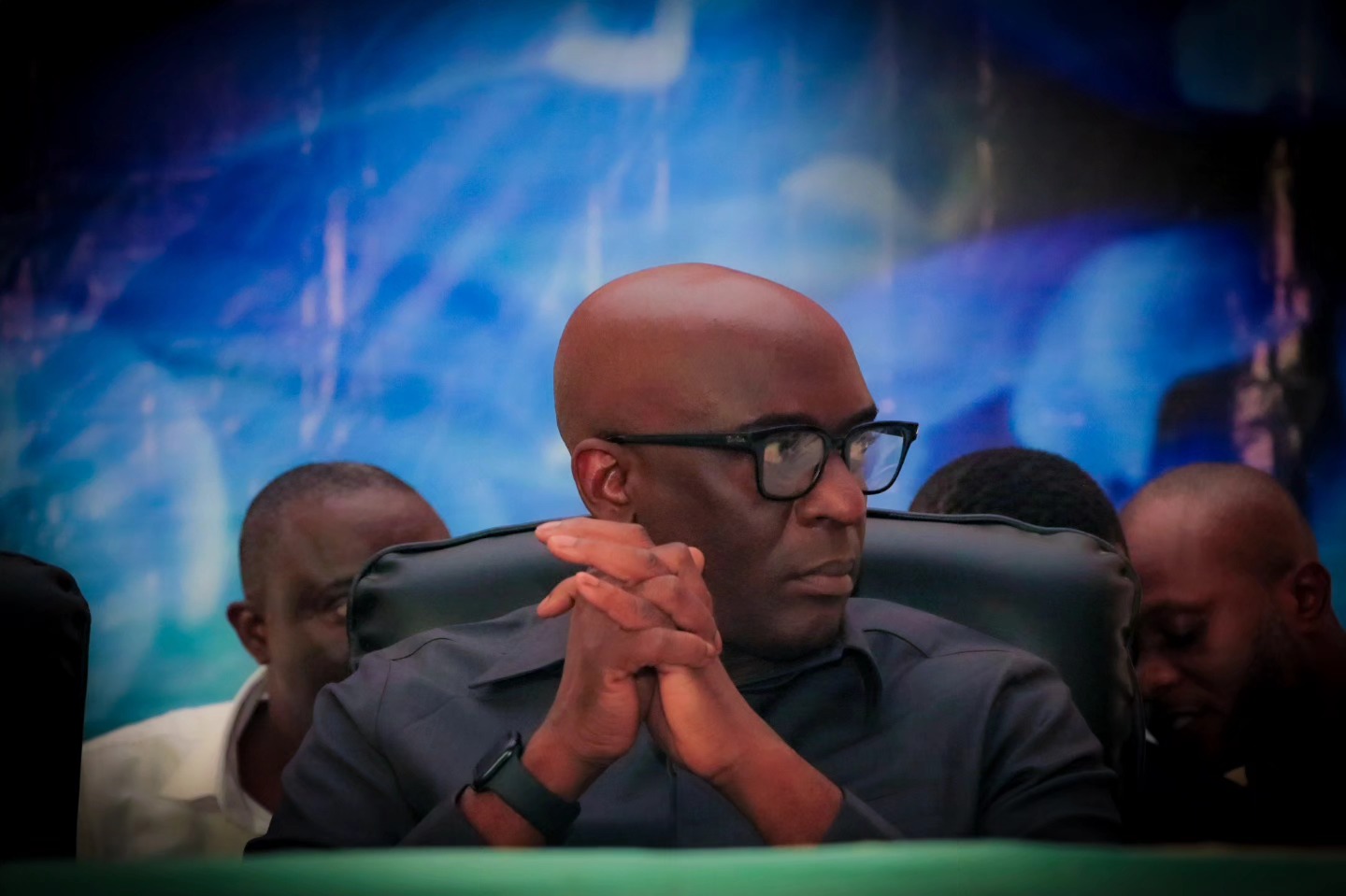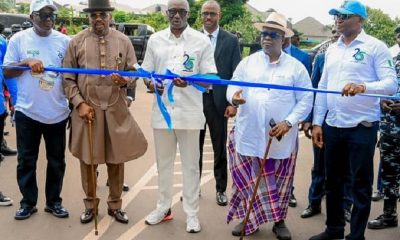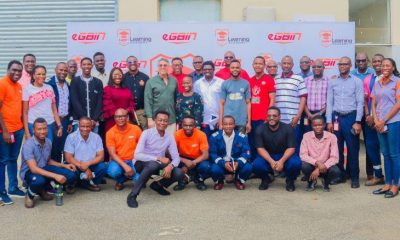Feature/OPED
A Reformer’s Strategic Efforts in Educational Sector, Human Capital Development

By Jerome-Mario Utomi
Through a noteworthy conviction that education is the bedrock of any nation and so it is incumbent on all to grow and support the education sector, coupled with significant moves that underscore commitment to the socioeconomic development of the nation, Mr Chiedu Ebie, a reformer, technocrat and chairman of the governing board of the Niger Delta Development Commission (NDDC), has famously become reputed for supporting sustainable development of education sector at state, regional and federal levels as well as encourages formulation and transparent implementation of diverse strategic youth empowerment initiatives and programmes.
Adding context to the discourse, Mr Ebie, before the NDDC appointment, served as the Delta State Commissioner for Basic and Secondary Education (July 2015 to May 2019), and Secretary to the Delta State Government (SSG) from 2019 to May 2021.
Aside from the significant reforms and improvements in the primary and secondary educational sectors, particularly, the transparent recruitment of 1,000 teachers posted across secondary schools in the state as well as other far-reaching policies designed and implemented while serving in those capacities (Commissioner and SSG), those who understand the purpose of public leadership realized that he did more than echoing the line of the government but stayed with multiple stakeholders across the state and beyond. He recognized early on that doing so was especially critical for promoting peace and fostering unity between the government and the governed.
In March 2024, he chaired the 2nd Founders Day of the University of Delta (UNIDEL), Agbor. It was a day to celebrate and take stock of the progress thus far of this young institution of higher learning established from the defunct College of Education Agbor three years ago by the Delta State Government at the time when he functioned as SSG.
The event, which had the Managing Director of Zenith Bank Plc, Dr Ebenezer Onyeagwu (as he then was), as a guest lecturer, provided another veritable opportunity for Mr Ebie to demonstrate his undying support for the upcoming generation and love for human capacity development.
To this end, he, on behalf of his family, instituted the Prof John Ebie Award for the best graduating medical student in honour of his late father, who was a medical doctor and professor of mental health. Correspondingly, as a lawyer, he also did likewise for the best-graduating student from the faculty of law and also included a full scholarship for a second-year law student who has a GPA of 5.0 as a way of supporting and encouraging her.
Ebie said, “It was surely a good outing that allowed me to catch up with former colleagues and friends, but more importantly, to support the development of the proposed Ika language and cultural centre where handsome donations were made by Ika sons and daughters.
“Kudos to the Vice Chancellor, Prof Stella Chiemeke and her team for the progress made so far. We will continue to support the growth and development of education.”
Before the dust of excitement raised by Mr Ebie’s gesture could settle, another was up! This time around, he championed the prioritisation of education of the girl child in his capacity as the chairman of NDDC.
Speaking at a ceremony put together by the agency to mark the International Women’s Day in Agbor, Delta State, Mr Ebie, represented by his Special Assistant, John Aleh, stated that “as a pivotal segment of the population, educating the girl child empowers women to succeed in all areas of life.”
Apart from championing girl child education, the commission has revived the annual Moot & Mock Trial Competition for law faculties of universities located within the NDDC States.
The yearly event, Mr Ebie explained, will help in preparing and shaping the minds of our bright scholars into top-rate lawyers in the not-too-distant future.
As a famous team player, he seamlessly teamed up with other members of the governing board and management of the Commission to incubate policies aimed at improving the life chances of the people of the Niger Delta region.
A topical and typical illustration of such an initiative was the seeing-through of the award of scholarships to 200 successful candidates from the region to pursue Master’s Degrees overseas, a programme which of course is an important component of the agency’s human capital development that seeks to use education to change the fortunes of the region and its people.
While the entire process may have climaxed with the presentation of letters to the prospective scholars at a pre-departure and award ceremony held recently in Port Harcourt, the Rivers State capital, what is, however, newsy is the high-level transparency which characterized the process and made it possible for most of the beneficiaries to be those who never knew anyone from the NDDC or anyone who works there.
Whereas the above resounding efforts coming from Mr Ebie and his colleagues at NDDC are well understood and celebrated, one effort from his team that this piece considers most striking because of its far-reaching effect on the youths from the region is the recently launched 12-month internship scheme in Port Harcourt, Rivers State, targeting 10,000 youths across the Niger Delta.
This initiative is not only aimed at advancing the federal government’s Renewed Hope Agenda under President Bola Tinubu but also at equipping the region’s youths with essential skills for meaningful employment and sustainable livelihoods.
The newly rolled-out internship program is designed to offer participants practical training and valuable work experience in various sectors, including technology, music and arts, agriculture, and marine industries. Each participant will receive a monthly stipend of N50,000, which will support them throughout the duration of the program.
However, the most remarkable aspect of the scheme, which has garnered widespread attention and praise, is the special emphasis on inclusivity, particularly for persons with disabilities.
During the launch, Mr Ebie made a groundbreaking announcement that has been lauded as a milestone in the region’s development agenda.
He declared that persons with disabilities (PWDs) would receive special consideration under the internship scheme, ensuring that they have equal opportunities to participate and benefit from the program.
He further encouraged disabled youths to apply and clearly state their disabilities during the application process, emphasizing that the scheme is open to young people across all educational backgrounds and levels of experience.
This inclusive approach is not just a gesture; it represents a significant shift in the way persons with disabilities are perceived and treated within the Niger Delta region and Nigeria as a whole. It is indeed, a bold step towards addressing the longstanding challenges that have marginalized PWDs from mainstream economic opportunities.
Jerome-Mario Utomi, a communicator, writes from Lagos and can be reached via je*********@***oo.com/08032725374
Feature/OPED
How Christians Can Stay Connected to Their Faith During This Lenten Period

It’s that time of year again, when Christians come together in fasting and prayer. Whether observing the traditional Lent or entering a focused period of reflection, it’s a chance to connect more deeply with God, and for many, this season even sets the tone for the year ahead.
Of course, staying focused isn’t always easy. Life has a way of throwing distractions your way, a nosy neighbour, a bus driver who refuses to give you your change, or that colleague testing your patience. Keeping your peace takes intention, and turning off the noise and staying on course requires an act of devotion.
Fasting is meant to create a quiet space in your life, but if that space isn’t filled with something meaningful, old habits can creep back in. Sustaining that focus requires reinforcement beyond physical gatherings, and one way to do so is to tune in to faith-based programming to remain spiritually aligned throughout the period and beyond.
On GOtv, Christian channels such as Dove TV channel 113, Faith TV and Trace Gospel provide sermons, worship experiences and teachings that echo what is being practised in churches across the country.
From intentional conversations on Faith TV on GOtv channel 110 to true worship on Trace Gospel on channel 47, these channels provide nurturing content rooted in biblical teaching, worship, and life application. Viewers are met with inspiring sermons, reflections on scripture, and worship sessions that help form a rhythm of devotion. During fasting periods, this kind of consistent spiritual input becomes a source of encouragement, helping believers stay anchored in prayer and mindful of God’s presence throughout their daily routines.
To catch all these channels and more, simply subscribe, upgrade, or reconnect by downloading the MyGOtv App or dialling *288#. You can also stream anytime with the GOtv Stream App.
Plus, with the We Got You offer, available until 28th February 2026, subscribers automatically upgrade to the next package at no extra cost, giving you access to more channels this season.
Feature/OPED
Turning Stolen Hardware into a Data Dead-End

By Apu Pavithran
In Johannesburg, the “city of gold,” the most valuable resource being mined isn’t underground; it’s in the pockets of your employees.
With an average of 189 cellphones reported stolen daily in South Africa, Gauteng province has become the hub of a growing enterprise risk landscape.
For IT leaders across the continent, a “lost phone” is rarely a matter of a misplaced device. It is frequently the result of a coordinated “snatch and grab,” where the hardware is incidental, and corporate data is the true objective.
Industry reports show that 68% of company-owned device breaches stem from lost or stolen hardware. In this context, treating mobile security as a “nice-to-have” insurance policy is no longer an option. It must function as an operational control designed for inevitability.
In the City of Gold, Data Is the Real Prize
When a fintech agent’s device vanishes, the $300 handset cost is a rounding error. The real exposure lies in what that device represents: authorised access to enterprise systems, financial tools, customer data, and internal networks.
Attackers typically pursue one of two outcomes: a quick wipe for resale on the secondary market or, far more dangerously, a deep dive into corporate apps to extract liquid assets or sellable data.
Clearly, many organisations operate under the dangerous assumption that default manufacturer security is sufficient. In reality, a PIN or fingerprint is a flimsy barrier if a device is misconfigured or snatched while unlocked. Once an attacker gets in, they aren’t just holding a phone; they are holding the keys to copy data, reset passwords, or even access admin tools.
The risk intensifies when identity-verification systems are tied directly to the compromised device. Multi-Factor Authentication (MFA), widely regarded as a gold standard, can become a vulnerability if the authentication factor and the primary access point reside on the same compromised device. In such cases, the attacker may not just have a phone; they now have a valid digital identity.
The exposure does not end at authentication. It expands with the structure of the modern workforce.
65% of African SMEs and startups now operate distributed teams. The Bring Your Own Device (BYOD) culture has left many IT departments blind to the health of their fleet, as personal devices may be outdated or jailbroken without any easy way to know.
Device theft is not new in Africa. High-profile incidents, including stolen government hardware, reinforce a simple truth: physical loss is inevitable. The real measure of resilience is whether that loss has any residual value. You may not stop the theft. But you can eliminate the reward.
Theft Is Inevitable, Exposure is Not
If theft cannot always be prevented, systems must be designed so that stolen devices yield nothing of consequence. This shift requires structured, automated controls designed to contain risk the moment loss occurs.
Develop an Incident Response Plan (IRP)
The moment a device is reported missing, predefined actions should trigger automatically: access revocation, session termination, credential reset and remote lock or wipe.
However, such technical playbooks are only as fast as the people who trigger them. Employees must be trained as the first line of defence —not just in the use of strong PINs and biometrics, but in the critical culture of immediate reporting. In high-risk environments, containment windows are measured in minutes, not hours.
Audit and Monitor the Fleet Regularly
Control begins with visibility. Without a continuous, comprehensive audit, IT teams are left responding to incidents after damage has occurred.
Opting for tools like Endpoint Detection and Response (EDR) allows IT teams to spot subtle, suspicious activities or unusual access attempts that signal a compromised device.
Review Device Security Policies
Security controls must be enforced at the management layer, not left to user discretion. Encryption, patch updates and screen-lock policies should be mandatory across corporate devices.
In BYOD environments, ownership-aware policies are essential. Corporate data must remain governed by enterprise controls regardless of device ownership.
Decouple Identity from the Device
Legacy SMS-based authentication models introduce avoidable risk when the authentication channel resides on the compromised handset. Stronger identity models, including hardware tokens, reduce this dependency.
At the same time, native anti-theft features introduced by Apple and Google, such as behavioural theft detection and enforced security delays, add valuable defensive layers. These controls should be embedded into enterprise baselines rather than treated as optional enhancements.
When Stolen Hardware Becomes Worthless
With POPIA penalties now reaching up to R10 million or a decade of imprisonment for serious data loss offences, the Information Regulator has made one thing clear: liability is strict, and the financial fallout is absolute. Yet, a PwC survey reveals a staggering gap: only 28% of South African organisations are prioritising proactive security over reactive firefighting.
At the same time, the continent is battling a massive cybersecurity skills shortage. Enterprises simply do not have the boots on the ground to manually patch every vulnerability or chase every “lost” terminal. In this climate, the only viable path is to automate the defence of your data.
Modern mobile device management (MDM) platforms provide this automation layer.
In field operations, “where” is the first indicator of “what.” If a tablet assigned to a Cape Town district suddenly pings on a highway heading out of the city, you don’t need a notification an hour later—you need an immediate response. An effective MDM system offers geofencing capabilities, automatically triggering a remote lock when devices breach predefined zones.
On Supervised iOS and Android Enterprise devices, enforced Factory Reset Protection (FRP) ensures that even after a forced wipe, the device cannot be reactivated without organisational credentials, eliminating resale value.
For BYOD environments, we cannot ignore the fear that corporate oversight equates to a digital invasion of personal lives. However, containerization through managed Work Profiles creates a secure boundary between corporate and personal data. This enables selective wipe capabilities, removing enterprise assets without intruding on personal privacy.
When integrated with identity providers, device posture and user identity can be evaluated together through multi-condition compliance rules. Access can then be granted, restricted, or revoked based on real-time risk signals.
Platforms built around unified endpoint management and identity integration enable this model of control. At Hexnode, this convergence of device governance and identity enforcement forms the foundation of a proactive security mandate. It transforms mobile fleets from distributed risk points into centrally controlled assets.
In high-risk environments, security cannot be passive. The goal is not recovery. It is irrelevant, ensuring that once a device leaves authorised hands, it holds no data, no identity leverage, and no operational value.
Apu Pavithran is the CEO and founder of Hexnode
Feature/OPED
Daniel Koussou Highlights Self-Awareness as Key to Business Success

By Adedapo Adesanya
At a time when young entrepreneurs are reshaping global industries—including the traditionally capital-intensive oil and gas sector—Ambassador Daniel Koussou has emerged as a compelling example of how resilience, strategic foresight, and disciplined execution can transform modest beginnings into a thriving business conglomerate.
Koussou, who is the chairman of the Nigeria Chapter of the International Human Rights Observatory-Africa (IHRO-Africa), currently heads the Committee on Economic Diplomacy, Trade and Investment for the forum’s Nigeria chapter. He is one of the young entrepreneurs instilling a culture of nation-building and leadership dynamics that are key to the nation’s transformation in the new millennium.
The entrepreneurial landscape in Nigeria is rapidly evolving, with leaders like Koussou paving the way for innovation and growth, and changing the face of the global business climate. Being enthusiastic about entrepreneurship, Koussou notes that “the best thing that can happen to any entrepreneur is to start chasing their dreams as early as possible. One of the first things I realised in life is self-awareness. If you want to connect the dots, you must start early and know your purpose.”
Successful business people are passionate about their business and stubbornly driven to succeed. Koussou stresses the importance of persistence and resilience. He says he realised early that he had a ‘calling’ and pursued it with all his strength, “working long weekends and into the night, giving up all but necessary expenditures, and pressing on through severe setbacks.”
However, he clarifies that what accounted for an early success is not just tenacity but also the ability to adapt, to recognise and respond to rapidly changing markets and unexpected events.
Ambassador Koussou is the CEO of Dau-O GIK Oil and Gas Limited, an indigenous oil and natural gas company with a global outlook, delivering solutions that power industries, strengthen communities, and fuel progress. The firm’s operations span exploration, production, refining, and distribution.
Recognising the value of strategic alliances, Koussou partners with business like-minds, a move that significantly bolsters Dau-O GIK’s credibility and capacity in the oil industry. This partnership exemplifies the importance of building strong networks and collaborations.
The astute businessman, who was recently nominated by the African Union’s Agenda 2063 as AU Special Envoy on Oil and Gas (Continental), admonishes young entrepreneurs to be disciplined and firm in their decision-making, a quality he attributed to his success as a player in the oil and gas sector. By embracing opportunities, building strong partnerships, and maintaining a commitment to excellence, Koussou has not only achieved personal success but has also set a benchmark for future generations of African entrepreneurs.
His journey serves as a powerful reminder that with determination and vision, success is within reach.
-

 Feature/OPED6 years ago
Feature/OPED6 years agoDavos was Different this year
-
Travel/Tourism10 years ago
Lagos Seals Western Lodge Hotel In Ikorodu
-

 Showbiz3 years ago
Showbiz3 years agoEstranged Lover Releases Videos of Empress Njamah Bathing
-

 Banking8 years ago
Banking8 years agoSort Codes of GTBank Branches in Nigeria
-

 Economy3 years ago
Economy3 years agoSubsidy Removal: CNG at N130 Per Litre Cheaper Than Petrol—IPMAN
-

 Banking3 years ago
Banking3 years agoSort Codes of UBA Branches in Nigeria
-

 Banking3 years ago
Banking3 years agoFirst Bank Announces Planned Downtime
-

 Sports3 years ago
Sports3 years agoHighest Paid Nigerian Footballer – How Much Do Nigerian Footballers Earn


















